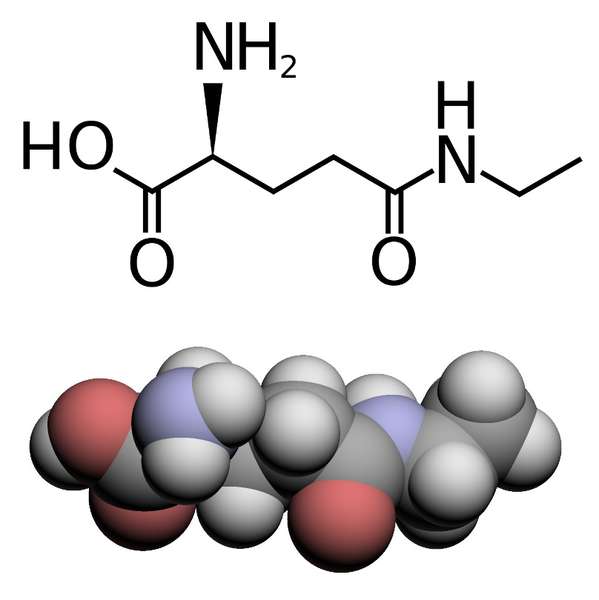L-Theanine and Tea
Wikipedia: L-TheanineLast Updated: Oct. 31, 2013L-theanine is a water soluble chemical found in tea, responsible for some of the effects of tea on the mind and body, as well as influencing the flavor of tea. It is found in a number of foods, and is an amino acid derivative, related to glutamic acid.
Which teas have the most L-theanine?
The concentration of L-theanine in any kind of tea is high, for this relatively uncommon chemical. Two of the teas with the highest known concentration, gyokuro and Anji bai cha, contain around 2% L-theanine by dry weight. Most other teas are closer to 1% by dry weight.L-theanine has a savory or umami taste
L-theanine, being chemically similar to glutamic acid, imparts a distinct flavor to foods: it activates the same taste receptors as glutamate (MSG), and thus has a savory or umami flavor. Its high concentration in teas such as gyokuro and Anji bai cha imparts a noticable savory quality to these teas.Effects of L-theanine on mind and body: alertness from caffeine, and relaxation
L-theanine has a number of effects on mind and body. Its effects are not fully understood, and are a subject of ongoing research.L-theanine interacts with caffeine, promoting increased alertness with smaller doses of caffeine; this effect has long been suggested, and has been confirmed by a controlled study.[1] This may explain why tea is so popular for boosting concentration, even though it contains so much less caffeine than coffee. L-theanine also seems to play a role in relaxation. The interaction with caffeine combined with the relaxing effects has led people to claim that L-theanine promotes a relaxed alertness. L-theanine may also promote healthy sleep, and may be one of the reasons that tea seems to play a positive role in sleep, in spite of its caffeine content.[2]
There is also evidence from studies on mice that L-theanine can protect the liver against damage caused by alcohol.[3]
Other names of L-theanine:
L-theanine is often just called theanine. The L is rather superfluous: R-theanine is not a biologically important molecule (all of the essential amino acids are of the left-handed form). L-theanine has many synonyms, including gamma-glutamylethylamide and 5-N-ethyl-glutamine, but these names are not commonly used.References:
1. Crystal F. Haskell et. al., The effects of l-theanine, caffeine and their combination on cognition and mood
, Biological Psychology, Vol. 77, No. 2, (Feb. 2008), pp. 113-122.
2. Russ Mason, 200 mg of Zen: L-Theanine Boosts Alpha Waves, Promotes Alert Relaxation, Alternative and Complementary Therapies, Vol. 7, No. 2, pp. 91-95, Apr. 2001.
3. Effects of Theanine on Alcohol Metabolism and Hepatic Toxicity, Biological & Pharmaceutical Bulletin, Vol. 28, No. 9 (2005).
Further Reading:
Theanine on WebMD - Medical information on the use of theanine as a supplement.
L-Theanine on Sloane-Kettering - A review of the scientific literature surrounding L-theanine.


